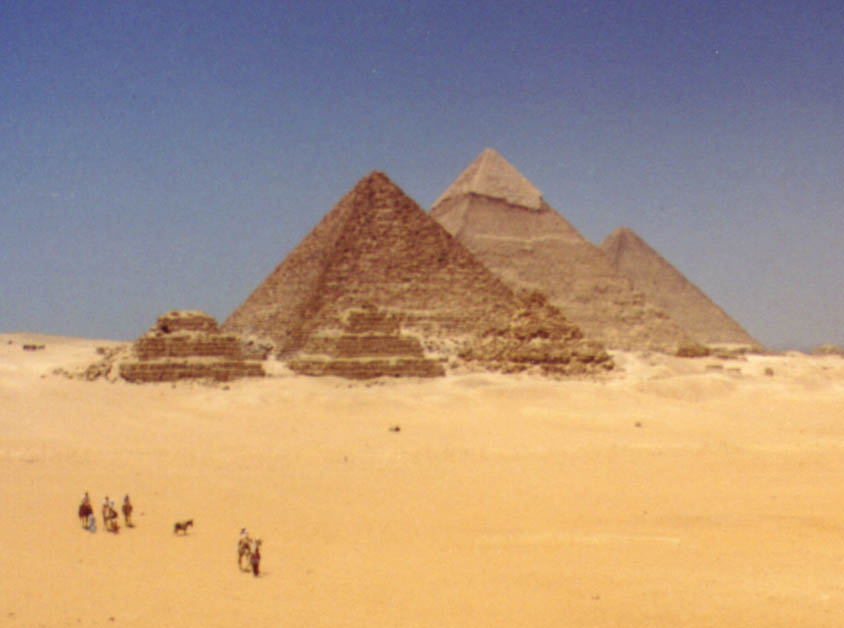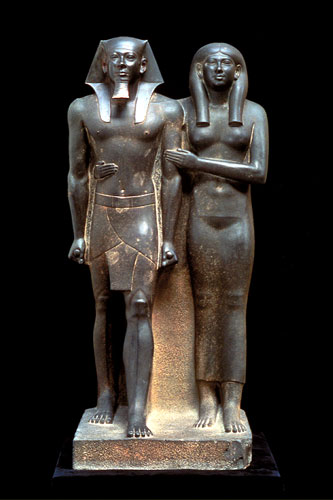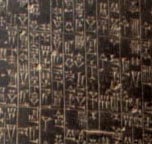|
|
Syracuse University REL
301 / MES 300 |
|
|
Time: 12:30-1:50 on Tuesdays & Thursdays
|
|
Course Description:
The ancient Near East produced the oldest written
texts in the world, along with much art and other
artifacts. They provide a window into the ways of
life, rituals, beliefs, hopes and fears of people
living 2,500 to 5,000 years ago and illustrate the
interplay between religion and human culture in all
its various forms. This course will explore the
interaction of culture and religion by examining the
social contexts of ancient religious ideas and
practices through close readings of texts from ancient
Egypt, Mesopotamia, Syria, Palestine, and Israel, and
close examination of textual artifacts. Parts of each students' research will involve hands-on examination of old textual artifacts in SU Library's Special Collections. Audience: Students interested in ancient
history, culture, and religion and wishing to fill
Humanities and Writing Intensive core requirements, as
well as majors and minors in Religion, Jewish Studies,
History, Literature and Art History. Goals: In this course, students will:
Course Requirements:
Attendance and participation in discussions is expected of all students and will influence my evaluation of their work (5%), which will also be based on their performance on daily quizzes (15% total), and four research papers (20% each). The grades of late papers will be reduced by one grade level (e.g. B to B-). Missed quizzes cannot be made up, but the lowest five quiz grades will be dropped. The grading scale is: A+ = 100, A = 95, A- = 92, B+ =
88, B = 85, B- = 82, C+ = 78, C = 75, C- = 72, D+ =
68, D = 65, D- = 62, F = 55. Incidents of plagiarism
or cheating result in no credit (0) for the test or
assignment and may result in further disciplinary
action (see academic integrity statement below).
Students may check their grades online through the Blackboard
Learning System. Class-room Behavior: A
successful learning experience depends on students'
behavior in class, as much as on the quality of their
work and on the teacher's presentations.
Academic Integrity: The Violation and Sanction Classification Rubric
establishes recommended guidelines for the
determination of grade penalties by faculty and
instructors, while also giving them discretion to
select the grade penalty they believe most suitable,
including course failure, regardless of violation
level. Any established violation in this course may
result in course failure regardless of violation
level. In this course, students found cheating on a
test or assignment will receive zero (0) credit for
that test or assignment and may result in further
disciplinary action. For more information and the
complete policy, see the Center for Learning and
Student Success (CLASS) in Bird Library or at
http://class.syr.edu/. Academic Integrity Online: Discrimination or Harassment:
The University does not discriminate and prohibits
harassment or discrimination related to any protected
category including creed, ethnicity, citizenship,
sexual orientation, national origin, sex, gender,
pregnancy, disability, marital status, age, race,
color, veteran status, military status, religion,
sexual orientation, domestic violence status, genetic
information, gender identity, gender expression or
perceived gender. Any complaint of discrimination or harassment related to any of these protected bases should be reported to Sheila Johnson-Willis, the University’s Chief Equal Opportunity & Title IX Officer. She is responsible for coordinating compliance efforts under various laws including Titles VI, VII, IX and Section 504 of the Rehabilitation Act. She can be contacted at Equal Opportunity, Inclusion, and Resolution Services, 005 Steele Hall, Syracuse University, Syracuse, NY 13244-1120; by email: titleix@syr.edu; or by telephone: 315-443-0211. Federal and state law, and University policy prohibit
discrimination and harassment based on sex or gender
(including sexual harassment, sexual assault,
domestic/dating violence, stalking, sexual
exploitation, and retaliation). If a student has been
harassed or assaulted, they can obtain confidential
counseling support, 24-hours a day, 7 days a week,
from the Sexual
and Relationship Violence Response Team at the
Counseling Center (315-443-4715, 200 Walnut Place,
Syracuse, New York 13244-5040). Incidents of sexual
violence or harassment can be reported
non-confidentially to the University’s Title IX
Officer (Sheila Johnson Willis, 315-443-0211, titleix@syr.edu,
005 Steele Hall). Reports to law enforcement can be
made to the University’s Department of Public Safety
(315-443-2224, 005 Sims Hall), the Syracuse Police
Department (511 South State Street, Syracuse, New
York, 911 in case of emergency or 315-435-3016 to
speak with the Abused Persons Unit), or the State
Police (844-845-7269). I will seek to keep information you share with me private to the greatest extent possible, but as a professor I have mandatory reporting responsibilities to share information regarding sexual misconduct, harassment, and crimes I learn about to help make our campus a safer place for all. Religious Observances
Policy: SU's
religious observances policy recognizes the
diversity of faiths represented among the campus
community and protects the rights of students,
faculty, and staff to observe religious holidays
according to their tradition. Under the policy,
students are provided an opportunity to make up any
examination, study, or work requirements that may be
missed due to are religious observance provided they
notify their instructors before the end of the second
week of classes. For fall and spring semesters, an
online notification process is available through MySlice/StudentServices/Enrollment/MyReligiousObservances from
the first day of class until the end of the second
week of class. Disability-Related
Accommodations: Syracuse
University values diversity and inclusion; we are
committed to a climate of mutual respect and full
participation. My goal as your instructor is to
create learning environments that are useable,
equitable, inclusive and welcoming. If there are
aspects of the instruction or design of this course
that result in barriers to your inclusion or
accurate assessment or achievement, I invite you to
talk with me to discuss additional strategies beyond
accommodations that may be helpful to your success,
and to collaborate with the Center for Disability
Resources (CDR) in this process. Health and Wellness: |
| Textbooks
(available at the campus bookstore in Schine Student Center): |
|
|
Required: |
|
|
Recommended: |
|
|
Topics & Assignments: Readings from the textbooks appear by
abbreviated title and page numbers; readings from
biblical books are marked BIBLE and appear as book
title (italics) and chapters; readings marked
BLACKBOARD appear under the "Documents" tab; and
assignments on the internet are underlined in blue (click the
active link). Papers: Instructions for the
four papers appears on Blackboard under the
"Assignments" tab. |
Topic
|
Date
|
Assignment (due by class on date listed) |
|
|
Introductions |
T Jan 17 |
|
|
|
History & Religion: Mesopotamia |
Th Jan 19 |
Gods 99-109, 131-136; "Kings & their
deeds" FDD
165-211; “Royal Prayers” FDD 272-87; Letter
from Kadashman; Letter
of Ashuruballit >
curatorial interpretation |
|
|
T Jan 24 |
Gods 111-118; “Creation Epic” FDD
9-51. |
||
|
History & Religion: Egypt |
Th Jan 26 |
Gods 3-14; Ancient Egypt;
“Longing for Memphis” AEL
44-47; “Instruction of Merikare”
AEL 191-204; “Testament of Amenemhat” AEL
85-88; “Prophecy of Neferty”
AEL 76-84; |
|
|
T Jan 31 |
Gods 15-23, 37-55; “Senusert”
and “Ramses” AEL
94-99; “Hymn to Osiris” AEL
102-109. |
|
|
|
History & Religion:
Syria-Palestine |
Th Feb 2 |
Gods 191-198, 219-25 ; “Kirta”
SFAC
64-95; Letter
about Abdu-Heba; Letter
from Abdu-Heba of
Jerusalem; |
|
|
T Feb 7 |
Gods 199-212, 228-237; “Baal” SFAC
97-153; |
|
|
|
Prophets & History What did ancient prophets do? What
were they concerned about? Why did people frequently
explain disasters as caused by god(s)? What feelings do laments emphasize? |
Th Feb 9 |
Gods 226-228, 264-273; “Prophecies” FDD
213-20: |
|
|
Paper #1 |
M Feb 13 |
Noon: First Paper Due |
|
|
Gods and Creation |
T Feb 14 |
Gods 26-36, 122-129; 212-218; “Shipwrecked
Sailor” AEL 8-16; “Hymns to Re & Amun”
AEL 118-21; “Hymn to Shamash” FDD
254-61; |
|
|
Art & Religion |
Th Feb 16 |
Ancient
Egyptian art; Assyrian
art; |
|
|
|
|||
|
Economics |
T Feb 21 | “Little Pepi”
AEL 32-43; “At the Cleaners” FDD
355-56; Life
of a salesman; "Grim
Secret"; Blackboard: Exchange, gift, & tribute; “Hymn to the Nile” AEL 110-17; “Hymns and Prayers” FDD 221-28. |
|
|
Women's Roles What roles did women play in law and economics? in politics? in wisdom literature? |
Th Feb 23 |
“Portrait
of the Queen” AEL 100-101; |
|
|
Love and sex |
T Feb 28 |
“Egyptian Love Songs” AEL
17-31, “Love spells" AEL 90, FDD
331-43, 351-54; Bible: Song of Songs 3-4; Gender Violence in Ancient Egypt; #MeToo-potamia; Abortion and Miscarriage in the Ancient Near East |
|
| Divine Gender & Sex What roles did women play in religion? What role did sex play? Did goddesses conform to typical female roles? If not, why not? |
Th Mar 2 |
Gods 23-26, 47-49, 118-122; “Hymns to Gula & Ishtar” FDD
229-246; Divine lovers FDD 344-50; "Aqat" SFAC
27-55; Bible: Hosea 2; Blackboard: Cult prostitution; Sacred marriage |
|
|
Ethnicity How did ancient people identify themselves and others? How do museums reflect and shape modern ethnicity? |
T Mar 7 |
“Tale of Sinuhe” AEL 124-48; |
|
|
Colonialism and Scholarship |
Th Mar 9 |
Napoleon
and the Scientific Expedition to Egypt; Pharaoh's
Needles; Blackboard: Said, Orientalism, 79-87. Porter, Chap. 3 from Handbook of Postcolonial Archaeology; Blackboard: MacDonald, "Egypt at the Petrie museum"; "Zahi Hawass"; African Origin Show at Met |
|
|
Paper #2 |
M Mar 20 |
Noon: Second Paper Due |
|
|
Bird Library 6th Floor Spector Rm:
Origins and history of writing |
T Mar 21 |
Gods xxiii-xxx; AEL
xi-xxi; FDD 1-8; SFAC 1-2; Origins
of writing. |
|
|
Education & Wisdom Literature
|
Th Mar 23 |
Gods 86-91, 182-84; “Dissipated Scribe” and “Minna’s
Lament” AEL 48-54; “Ptahhotep”
AEL 186-89; “Ashurbanipal” FDD 282;
“Why do you curse me?” FDD 363-64; “Wisdom of Amenemopet”
AEL 206-228; “Anzu”
FDD 115-131;
|
|
|
Bird Library 6th Floor Hillyer Rm |
T Mar 28 |
What
can fingerprints tell us? |
|
| |
|||
|
Justice I |
Th Mar 30 |
Blackboard: Roth, Hammurabi's Law
(read selections); “Eloquent Peasant” AEL
183-85, “Poor Man of Nippur” FDD 357-62,
“Land for the Birds” FDD 375-76; |
|
| Bird Library 6th Floor Spector Rm: Student
Research |
|||
|
T April 4 |
Bring list of three possible research
topics and/or texts in Special Collections. Bring
laptop. |
|
|
|
Justice II |
|||
|
Th April 6 |
“Dialogue,” “Righteous Sufferer,” “Babylonian
Theodicy” FDD 295-323; “Who
has not sinned?” “Piteous Sufferer” FDD
326-28; "Lament to Amun" AEL 123; |
|
|
|
Magic, Prayer and Ritual What motivated magical rituals and
divination? What distinguished good magic or rituals
from bad magic? Is (was) there a difference between
magic and prayer? What is it? |
T April 11 |
Gods 85-86, 177-182; Mesopotamian
Magic. “Magic & Divination” FDD
228, 252-53, 262-65, 393-432; |
|
|
Th April 13 |
Gods 77-85; 167-175, 257-264, 273-276;
“Prayer to Marduk” FDD
247-48, “Hymns and Prayers” FDD 221-26, “Hymn of Akhenaton” AEL
1-7; “Personal gods” FDD
267-71; “Letter Prayers” FDD 293-94; |
|
|
|
Paper #3 |
M April 17 |
Noon: Third Paper Due |
|
|
Death 1 What connections were there between
between death practices, living society, and
religion? How did burial practices reflect or
interact with these views? |
T April 18 |
Gods 57-65; Blackboard "Autobiography of Harkhuf"; Digital
Giza Project; Valley of
the Kings; Mummification
; 800
tombs; |
|
|
Th April 20 |
Gilgamesh (all); Gods 136-148, 153-154, 184-188; Bible: Genesis 6-8. |
||
|
Death 2, and Influences
& Survivals How did beliefs about the afterlife
differ in Egyptian, Mesopotamian and biblical
literatures? What do ancient stories mean when they
narrate the deaths of gods? |
T April 25 |
Gods 65-75, 91-96, 242-244; Blackboard: Egyptian Afterlife Abydos 1
and 2; |
|
|
Th April 27 |
Gods 154-165, 245-256, 277-284; “Stories of
Ishtar, Nergal, & Adapa”
FDD 78-101;
Abydos and Cult of Osiris |
|
|
|
Friday,
May 5, 12:01 pm |
|
Noon: Final Paper due |



